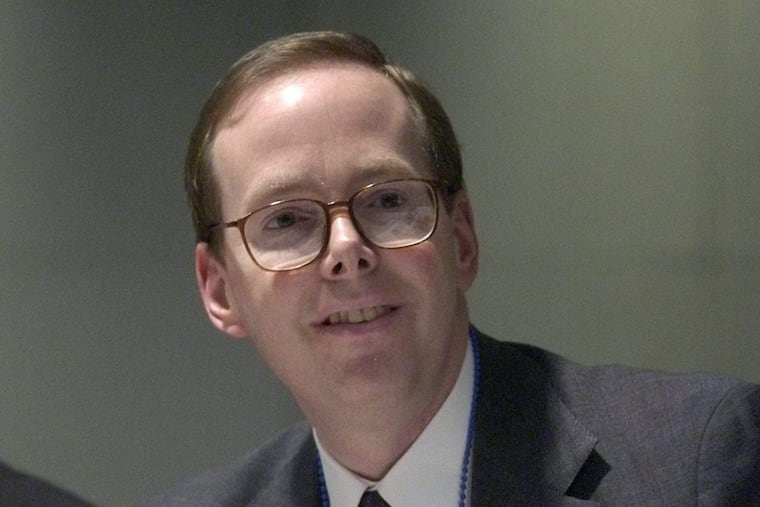BlackRock and Vanguard hire Egan-Jones to guide investors uninterested in social and environment woes
In recent years the ESG — environmental, social and governance — label has provoked investor pushback. Egan-Jones’ ESG-free option has been added to Vanguard and BlackRock's proxy voting guides.

It’s a sort of shareholder democracy: Every year U.S. companies invite investors or their representatives — “by proxy” — to vote on board members, audits, and a handful of business questions.
It’s mostly a formality. Few directors face insurgent candidates, and executive pay packages are usually approved. But the votes do give dissidents who want higher dividends, a change in management, or better risk disclosure a way to register discontent or embarrass recalcitrant board leaders into addressing complaints.
Advocates of corporate-governance reform, opponents of fossil fuels, and labor leaders also buy shares, take sides, and pressure larger investors to join them.
A small industry of proxy advisory firms, led by Glass Lewis, based in San Francisco, and Institutional Shareholder Services, in Rockville, Md., has grown up to review these questions and recommend when and why investors might consider voting against management’s recommendations.
The metrics used in their analyses are collected under the label ESG, for “environmental, social, and governance,” recalling an early 2000s United Nations-backed initiative to prod companies to reveal how much carbon they burn.
In recent years the ESG label has drawn opposition. Texas and other energy states have added rules to prevent public agencies from using ESG analysis that might result in actions like mandating sales of oil and gas company shares — actions that please climate-change activists and infuriate energy magnates.
Egan-Jones, a 50-person King of Prussia firm, best known as a credit-rating agency, which has tussled with the Securities and Exchange Commission over conflict-of-interest policies and with some of its own whistle-blowing ex-managers, has pioneered an alternative approach — the company has called it “conservative” — which sidelines social and environmental concerns.
This year the two largest money-management firms, New York-based BlackRock and Malvern-based Vanguard Group, have added Egan-Jones’ ESG-free option to their proxy voting guides to advise investors in some of their popular funds which proxy votes are most likely to make them richer, without regard to social or environmental questions.
“There’s been quite a lot of investor demand for a proxy-voting policy that is primarily focused on driving returns for investors” without engaging on environmental and social issues, said Wick Egan, director of business development and operations at Egan-Jones, whose founders include his father, Sean.
Vanguard, the second-largest asset manager with $9 trillion in assets from 50 million investors, on Nov. 18 added Egan-Jones’ Wealth-Focused Policy to a short menu of proxy adviser options that Vanguard introduced in early 2023 for investors in a handful of Vanguard’s most popular funds. BlackRock, which invests more than $13 trillion, added the Egan-Jones policy as an investor option in June.
That policy, formerly known as Egan-Jones’ Conservative Policy, now competes with Glass Lewis’ ESG advice and Vanguard’s own recommendations for investors in several participating Vanguard funds looking for guidance on companies’ yearly shareholder questions. Wick Egan says the policy takes governance seriously but leaves social and environmental issues to companies’ executives to decide.
“Everyone I know personally wants to maximize their risk-adjusted returns and minimize their tax burdens,” Egan said.
But he disputes investment industry headlines that have labeled this approach “anti-ESG.”
“We are very supportive of lots of companies which have an explicit ESG focus in their operations — they produce electric cars or solar panels, they might sell carbon credits,” Egan said. “That said, there has been a lot of negative feedback, particularly from conservative state treasurers, that ISS and Glass Lewis were tied exclusively to the pro-ESG approach. We [also] have an ESG policy, many of our clients use that.”
ESG offers pro-union and Catholic proxy advisory policies, as well.
Egan said the policy generally supports the same governance practices that Glass Lewis and ISS support. In the contested Walt Disney Co. board election earlier this year, Egan-Jones supported insurgent candidates, Glass Lewis backed management, and ISS split its support. The directors backed by Disney’s management won.
In another case this year, Egan Jones’ Wealth Focused Policy (and Vanguard in its own recommendations) supported Tesla’s $50 billion payout to Musk, which Glass Lewis and ISS opposed. Musk won, though the award is still subject to review by a Delaware judge.
Before adding Egan-Jones, Vanguard reported that 24% of 40,000 investors who participated in a yearlong pilot program asking whose guidance they wanted to follow preferred to apply Glass-Lewis’ ESG guidelines to shareholder votes. Thirty percent instructed Vanguard to vote the way each company’s board recommended. And 43% agreed to follow Vanguard’s own recommendations. Just 2% said they would rather not vote at all.
BlackRock, which has its own investor voting choice pilot program, also added the Egan-Jones policy to its voting options in June.
Shareholder choice “helps create a healthier corporate ecosystem,” said John Galloway, a former White House economic officer who serves as Vanguard’s global head of investment stewardship.
“We are serving 50 million individuals. We want to make sure we are providing our investors with clear policies” and giving them a few “clear and differentiated choices,” Galloway said.
Noting that some Vanguard investors doubted the value of environmental and social screens, he called Egan-Jones a “credible” adviser with the research capacity and track record to help further “democratize investing.”
Galloway says Vanguard itself “has no environmental or social lean” but does press corporate managers sometimes on better-governance issues.
Giving investors information to make their own choices on the shares they own “is really complicated,” Galloway concluded. “We believe that reasonable minds can disagree, as to some of those factors.”